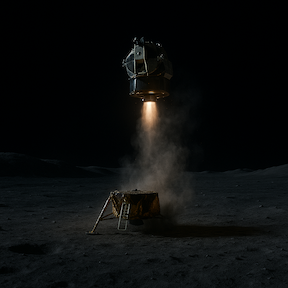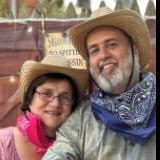It’s a “Wonder” Man Made It off the Moon — a Glimpse of Wonder entry™ — 4 of 5
There’s a reason why nearly every story ends with the characters heading home. That’s when the relief sets in — when the tension breaks, the dust settles, and you can finally exhale. But for those who actually went to the moon, the story wasn’t over once they arrived. In some ways, that’s when the danger peaked.
The Eagle had landed. The world rejoiced. But the crew of Apollo 11 — and every crew after them — still had to pull off something far more delicate than the landing. They had to leave.
That may sound simple. It’s anything but. Picture two men — tired, cramped, layered in dust — lying on their backs inside a module no bigger than a walk-in closet. Beneath them is the descent stage — spent fuel tanks and skeletal struts. And above them? A narrow capsule with a small engine that had never been test-fired in space.
If it didn’t ignite, they’d die there.
They were perched atop a spindly framework of metal, powered by a tiny ascent engine that wasn’t designed to fail — but also wasn’t proven to succeed. There was no rescue plan. No backup lander. No daring mission to go retrieve them. The physics didn’t allow it. The budget didn’t permit it. And the technology couldn’t support it.
In the worst-case scenario, NASA anticipated that the lunar module might never fire its engine. So much so, they prepared a full protocol — later known as “In Event of Moon Disaster.” If the ascent stage failed, Mission Control would permanently cut communications — ending all contact with the astronauts. A clergyman would be called to commend their souls, following a ritual like that used for sailors lost at sea. It would be quiet. Unannounced. Final. According to the July 8, 1971 issue of Awake!, even cosmic radiation posed dangers NASA hadn’t fully anticipated. Their engineers called it “the greatest hazard of space travel.”
The uncertainty of leaving the moon was so real that a speech was written for the President to deliver — in case they couldn’t get off the moon. You can read about it in our very first Glimpse of Wonder blog. A link will be provided at the end of this entry.
 That moment — when the countdown began for ascent — was quieter than liftoff. No crowd. No cameras. Just two astronauts hoping that a delicate series of switches, valves, and wires would behave. They flipped the final lever. The ignition command was given. The small golden ascent stage stuttered… and rose.
That moment — when the countdown began for ascent — was quieter than liftoff. No crowd. No cameras. Just two astronauts hoping that a delicate series of switches, valves, and wires would behave. They flipped the final lever. The ignition command was given. The small golden ascent stage stuttered… and rose.
Back on Earth, a room full of engineers and mission controllers didn’t cheer. Not yet. They waited. Waited for confirmation that it was actually working — that the angle was right, the thrust was stable, and the rendezvous would be possible. It was. Just barely. But it was.
There’s something deeply human about the fear of being left behind. We all feel it — not just in space. It taps into something primitive. Something wired into our brains from birth. But there’s something divine about knowing — truly knowing — that you’re not alone, even there.
“If I were to ascend to heaven, you would be there…” (Psalm 139:8)
Some may scoff at the idea that Jehovah sees everything. That He would care enough to extend His reach to the moon. But to those who understand the Creator’s presence — not as superstition but as certainty — the entire event becomes more than engineering. It becomes evidence. Survival was not guaranteed by machinery. It was permitted. And even in the barren silence of the moon, Jehovah was not far.
This wasn’t just a return to orbit. It was a delicate ballet. The ascent stage had to align just right with the command module — a fast-moving target overhead. A single missed calculation, a bent antenna, a broken signal — and the Eagle would float alone until its batteries gave out.
But the connection was made. The rendezvous worked. The lunar module rejoined Columbia in orbit, and the men who walked on the moon came home.
The lunar ascent engine had only one job — and one chance to do it.
It worked. They were no longer stranded.
And though the journey wasn’t over yet, it had been given permission to continue.
⸻
For more on the speech that was quietly prepared in case the astronauts couldn’t return, see:
“The Speech That Never Was — Nixon’s Contingency Plan for a Moon Disaster”
Edited by dljbsp
-
 1
1
-
 1
1
-
 1
1

0 Comments
Recommended Comments
There are no comments to display.
Join the conversation with your brothers and sisters!
You are posting as a guest. If you are already a member, sign in now to post with your existing account.
Note: Your post will require moderator approval before it will be visible.